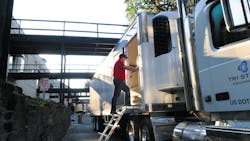Procuring a trailer or truck refrigeration unit in 2017 is quite different than it was 10, five or even one year ago, not only because of evolving technology, but also because of legislative regulations and mandates related to noise, emission and food safety standards.
The choices available today are plentiful, and can be overwhelming at best. To ensure the right decision for your application, fleet and budget, there are several key areas that are a must to consider.
1. Capacity – First and foremost, the product chosen has to meet the cooling requirements of the load; in other words, what are the capacity needs of the products being transported? Is it produce, meat, ice cream, pharmaceuticals or a mix? Will the products be hauled in multi-zone compartments or in a single compartment at a single temperature – fresh one day, frozen the next, or a consistent load and temperature day in and day out?
There are units of varying sizes and capacities to meet every need, some multi-purpose and some application specific.
2. Fuel Efficiency and Maintenance – To compete, earn a decent profit and in many cases, merely survive in today’s highly competitive over-the-road transport refrigeration industry, choosing a refrigeration unit that burns fuel efficiently, is easy to maintain and features a dependable performance record and warranty offering is a must. Fuel economy and unit reliability translate to less downtime, reduced maintenance expenses and increased bottom line profits.
Playing into these costs are accessories and options that are available with certain trailer and truck refrigeration units today, such as telematics and power management products, which can help produce and store power while on the road.
Telematics can track unit performance and location, remotely communicate status and provide a warning to prevent a small problem from becoming a catastrophic maintenance event. Power management accessories can include anything from solar panels that generate power and extend reefer battery life to boost chargers for liftgate battery charging, to supplemental alternators, to Thermo King EON power packs that power interior trailer lights and more.
Depending on the unique power needs of the truck or trailer, there are options to consider when choosing the refrigeration unit, and you’ll want to ensure compatibility.
3. Reliability and Durability – Transport refrigeration units, whether on trucks or trailers, take a beating while on the road. Depending on the operating location, they will be exposed to the full gamut of environmental factors, including extreme temperatures of heat and cold, precipitation and wind, not to mention various road hazards like rocks, salt, insects and even birds.
Units should be chosen that are built to withstand whatever is thrown at them.
4. CARB – California Air Resources Board (CARB) compliance is another consideration that has been on most radars for nearly 10 years, when California first announced its fight against environmental pollutants. If your refrigerated truck or trailer travels in or through California, and if you plan to keep the unit for more than seven years, it must meet CARB ultra-low vehicle emission standards or they must be fitted with a Level 3 emission device, such as a diesel particulate filter (DPF), which adds considerably to maintenance costs.
Today’s options for units that meet CARB’s evergreen requirement are limited but do include Thermo King’s Precedent S-600 or S-700 single temperature units and S-610M, C-600M or S-600DE multi-temperature trailer units.
5. Food Safety Modernization Act (FSMA) – Another major legislation, which came into effect in 2016, is the Federal Motor Carrier Safety Administration’s final rules for the Sanitary Transportation of Human and Animal Food (STF). The rule established requirements for shippers, loaders, carriers by motor or rail vehicle and receivers involved in transporting food to use documented sanitary practices to ensure the safety of that food.
Specifically, the rule has established requirements around record keeping and operations that should be considered when choosing the refrigeration unit and available accessories – like telematics and data loggers – that will satisfy STF requirements, offer proof of compliance and demonstrate safe food transport.
6. Total Cost of Ownership – Tied to bottom line profits, including residual value for resale, is total cost of ownership. When considering a refrigeration unit purchase, be sure to look at the big picture and not just upfront costs. Fuel, maintenance, reliability, legislative compliance and ensuring the safe transport of goods all play into the final equation.
Choose a reputable partner who can collaborate with you, provide a reliable network of trained service providers and offer valuable counsel on the refrigeration units that will best meet your needs.
Takeaway
There is no one-size-fits all refrigeration unit. Choose a supplier who:
- Can offer the selections that meet varying lifecycle and greater-than and less-than capacity requirements and various configurations.
- Can offer power management and telematics options that will give you both performance and peace-of-mind that your load will be protected.
- Has a history of providing reliable, long-lasting equipment and the operational training to ensure you use it properly.
- Will be with you for the long haul.
Tom Kampf is the senior product manager for trailers for Thermo King Corporation (http://www.thermoking.com/global). Founded in 1938, Thermo King and is a world leader in manufacturing and innovating transport temperature control systems for a variety of mobile applications, including trailers, truck bodies, buses, shipboard containers and rail cars.
